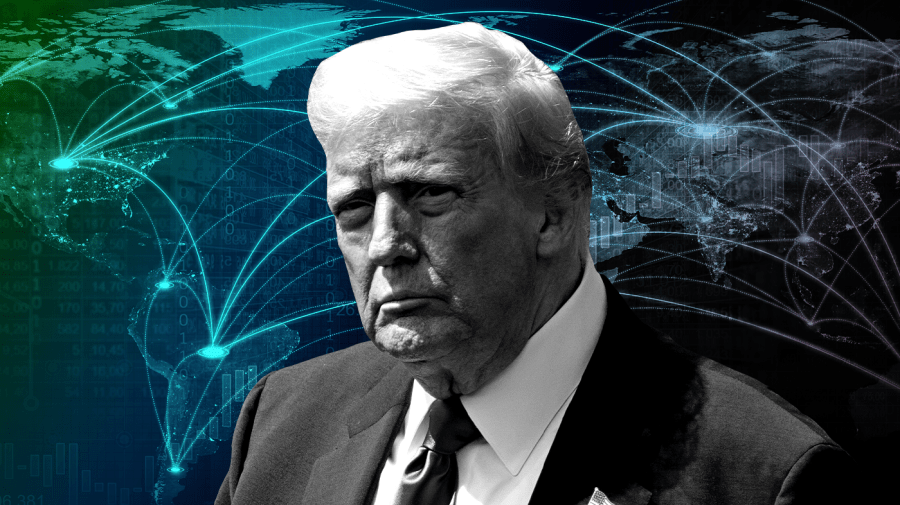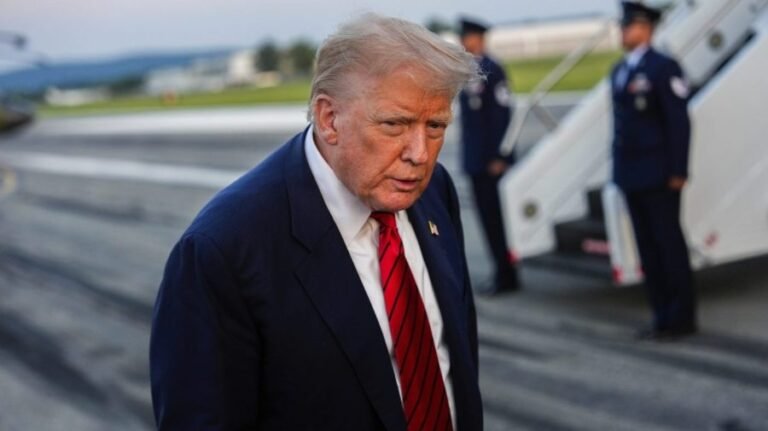
Republicans on Capitol Hill are feeling jittery about the economy after the latest jobs report showed the economy added far fewer jobs than previously estimated over the past three months.
President Trump and his economic team insist that the economy is going strong and poised for significant growth, but their bullish projections are meeting skepticism from some in the GOP who worry Trump’s trade regime is creating economic headwinds.
“It definitely is indicative of a weakened economy, an economy that’s not acting in a robust fashion. I’ve all along felt like there’s a lag between tariffs and actual economic downturn,” said Sen. Rand Paul (R-Ky.).
Trump announced a new round of tariffs, including steep tariff increases on Canada and Brazil, the same day the jobs report was released.
Paul argued the impact of tariffs are often delayed because companies usually sign contracts to set the prices of imports months in advance.
Once those contracts expire, the higher prices of imported raw materials or finished goods are then reflected in the next round of business agreements, he said.
“I’ve had retailers telling me that they think their prices will have to change in the fall. As their initial contracts change, their input price is higher [and] goods will go higher, too,” he said.
“I think it is worrisome and I do worry that the news has been relatively benign on tariffs so far,” Paul said. “The proof is really in the next couple months.
“I think there’s more to come. I don’t think we’ve seen the full impact of tariffs,” he said.
Sen. Jerry Moran (R-Kan.) warned that Trump’s fluctuating tariff rates are increasing costs for consumers and creating uncertainty among businesses and employers.
“My view is that there’s no question that consumers, Americans, pay a price for tariffs. It increases the price of the goods coming into the United States. The question is, ‘Is there a reason that tariffs in a temporary way can solve trade barriers that have been artificially created against our products going somewhere else?’” he said.
The Kansas senator said Trump’s tariffs could have “a beneficial outcome” if they can get other countries to open their markets to U.S. goods but cautioned “there’s no question tariffs are a tax on the cost of a product, a good.”
“A tax raises the cost of living for everybody,” he said.
Asked about the impact on job creators, Moran replied: “I know enough to know that certainty matters and at the moment there’s not very much certainty about what’s happening next.”
“Therefore, businesses delay decisions to expand, to hire, to spend money. So uncertainty creates a challenge for a growing economy,” he warned.
A third Republican senator who requested anonymity said Friday’s weak jobs report creates a significant political problem for Trump and Republicans in Congress.
“I don’t think that the administration can ignore them,” the senator said of the jobs report.
“You have to see that connection, that link” between the disappointing jobs report and Trump’s tariff policies, the senator said.
“I don’t think spinning it is good enough,” the source added.
The president responded to the negative jobs report by firing the head of the Bureau of Labor Statistics (BLS), Erika McEntarfer. The report revised down the number of jobs gained in May and June by 258,000.
But that move is also getting a skeptical response form some Republicans.
Sen. Thom Tillis (R-N.C.) warned that the shake-up at the data-reporting agency could undermine confidence in future economic data.
“The numbers are what the numbers are,” Tillis said. “If we get to a point to where BLS [and] all these organizations that are considered to be the gold standard for data, if we start undermining them or people start losing their jobs because we don’t like the result, that’s a big boo-boo.”
“There are a lot of government-reporting agencies that are like the gold standard for financial markets,” he said, warning “there better just be very clear evidence” of misconduct to support McEntarfer’s termination.
“If they don’t” provide that evidence, “I think they’re making a huge mistake,” he said.
Several major U.S. employers have reported substantial business losses in recent weeks.
Ford Motor reported last week a net loss of $36 million from April through June, compared with a profit of $1.8 billion a year ago. The automotive giant projects tariffs will cost it $2 billion this year alone.
Omaha-based Berkshire Hathaway on Saturday reported that its earnings dropped by 4 percent compared with a year ago, in part because of tariffs.
The company warned in its second-quarter earnings report that the “adverse consequences” of international trade policies and tariffs “could significantly affect our future results.”
United Parcel Services’s stock dropped last week after it reported weaker-than-expected earnings. The company said it would no longer provide forward guidance on revenues and profits, citing the lack of certainty in the economic outlook for the rest of this year.
Appliance maker Whirlpool also announced disappointing second-quarter earnings and said it would lower its quarterly dividend payout.
Some Republicans on Capitol Hill have said for months that they could support tariffs for a short period of time to put pressure on foreign trading partners to negotiate better deals for U.S. exporters but warned against putting long-term tariffs in place.
Texas Sen. Ted Cruz (R) warned in April that “high tariffs in perpetuity” would be bad for the economy.
“I am not a fan of tariffs,” Cruz told Fox Business host Larry Kudlow at the time.
“My hope is these tariffs are short-lived and they serve as leverage to lower tariffs across the globe,” he said.
National Economic Council Director Kevin Hassett dampened Republican hopes that high tariff rates would be transient when he told NBC’s “Meet the Press” on Sunday that many rates are already locked in
Asked by NBC’s Kristen Welker if Trump would change tariff rates if the financial markets dive, Hassett said: “I would rule it out because these are final deals.”


